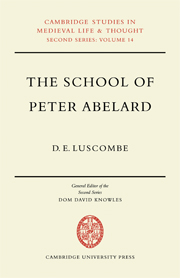Book contents
- Frontmatter
- Contents
- Preface
- List of Abbreviations
- I The Literary Evidence
- II Abelard's Followers
- III The Diffusion of Abelardian Writings
- IV The Condemnation of 1140
- V The Theological Writings of Abelard's Closest Disciples
- VI The School of Laon
- VII Hugh of St Victor
- VIII The Summa Sententiarum
- IX Abelard and the Decretum of Gratian
- X Abelard's Disciples and the School of St Victor
- XI Peter Lombard
- XII Robert of Melun
- XIII Richard of St Victor
- XIV Conclusion
- Appendices
- Bibliography
- Index of Manuscripts
- General Index
XII - Robert of Melun
Published online by Cambridge University Press: 05 November 2011
- Frontmatter
- Contents
- Preface
- List of Abbreviations
- I The Literary Evidence
- II Abelard's Followers
- III The Diffusion of Abelardian Writings
- IV The Condemnation of 1140
- V The Theological Writings of Abelard's Closest Disciples
- VI The School of Laon
- VII Hugh of St Victor
- VIII The Summa Sententiarum
- IX Abelard and the Decretum of Gratian
- X Abelard's Disciples and the School of St Victor
- XI Peter Lombard
- XII Robert of Melun
- XIII Richard of St Victor
- XIV Conclusion
- Appendices
- Bibliography
- Index of Manuscripts
- General Index
Summary
The connections between Britain and the scholastic centres of France in the twelfth century are important and many reputable scholars and writers either came to France from across the Channel or were eventually to be domiciled in England. They include Achard of St Victor, Adam of Balsham and of the Petit Pont, Adelard of Bath, Alexander Ncquam, Andrew of St Victor, Bartholomew of Exeter, Daniel Morley, Ervisius of St Victor, Gilbert Crispin, Gilbert the Universal, Gerald of Wales, John of Cornwall, John of Salisbury, Lawrence of Westminster, Ralph of Beauvais, Richard of St Victor, Robert of Mclun, Robert Pullen and Stephen Langton.
Robert of Melun was English by birth and died as bishop of Hereford in 1167. The greater part of his career was spent in French schools, notably Melun and Paris which he left finally in 1160. In the 1150s and perhaps in the early 1160s he composed his Sentences but without, it seems, completing his work. In about 1157 or in previous years, Robert issued 125 Questiones de divina pagina, most of them centred on Matthew's Gospel and arranged rather weakly. At a similar period he issued his Questiones de epistolis Pauli. Robert had played, in concert with Peter Lombard, a leading role against Gilbert of Poitiers at Paris in 1147. Later with Maurice of Sully he opposed the Christology of Peter Lombard. The mid-century was no period of calm following the freshness and rapid fluidity of the time of Abelard, but it was a time when reflection upon earlier and perhaps more hectic debates was possible and when most questions, particularly those raised by Abelard, had a tradition of disputation behind them.
- Type
- Chapter
- Information
- The School of Peter AbelardThe Influence of Abelard's Thought in the Early Scholastic Period, pp. 281 - 298Publisher: Cambridge University PressPrint publication year: 1969
- 1
- Cited by

